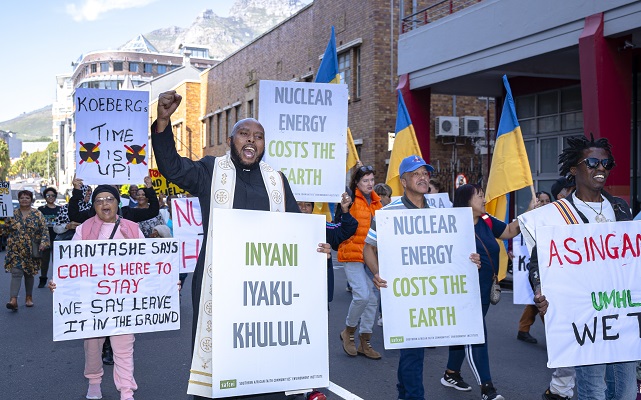Faith communities advocating for a just energy transition in South Africa, Malawi, Zambia, and Zimbabwe

South Africa’s energy policy currently focuses on natural resource extraction and nuclear power. 90 per cent of electricity remains coal generated. Several regional governments follow this example and contemplate policies favouring gas and oil, including seismic testing and fracking. This IKI Small Grants project seeks to support faith leaders in the Southern African region with information and resources on a just energy transition, so that they and their faith communities can effectively respond to local energy challenges. The project strengthens a network of faith leaders and their communities in South Africa, Malawi, Zambia, and Zimbabwe that work on just energy transition and climate justice. Knowledge on energy and climate change, and effective community action, is built and disseminated in these communities. 100 representatives of different faiths are informed on energy and climate policies through training and networking activities and at least 30 awareness meetings are conducted.
INITIAL SITUATION
Continued exploration and extraction of non-renewables are harmful to people’s health and the environment, displace people from their land, and accelerate climate change. In the Southern African region, nuclear, gas, oil, and coal continue to be prioritised as primary energy sources. Regional governments have signed nuclear power agreements and handed over public land and oceans for exploration of gas and oil, including seismic testing and fracking. Obsolete technologies and unsustainable energy solutions are thus being pushed on Southern Africa – despite a global acceleration to clean and inexpensive renewable energy.
TARGET GROUP
The project’s beneficiaries are faith leaders, ‘green champions’, and communities in Malawi, South Africa, Zambia, and Zimbabwe. The project can draw on relationships with Councils of Churches, its network through civil society, and self-identified faith communities. In total, the project reaches 100 faith leaders, with 50 per cent being women and 25 per cent considered youth.
APPROACH AND ACTIVITIES
This IKI Small Grants project seeks to support faith leaders in the Southern African region with information and resources on a just energy transition. The idea is that faith leaders work with their faith communities to respond effectively to locally identified energy issues and prioritise local struggles of people affected by poor energy decision-making.
The project engages with networks of non-governmental organisations and broader civil society to advocate for a just energy future. A regional network of faith leaders and communities – with a multi-faith constituency can hold executives to account when energy planning lacks transparency and legitimacy and fails to transition towards clean and affordable energy systems. This project addresses groups of all faiths and communities, who consider themselves as non-religious. It thus reaches people who are members of large hierarchical church institutions, small independent Buddhist and Baháʼí communities, and indigenous and traditional faith leaders. Advocacy and civil society processes enable engagement and aim to influence the adoption of genuinely ‘green’ policies and legislation.
To do so, the project trains 100 faith leaders in eco-theology and environmental science. It further trains them in campaign and lobbying strategies, so they may advocate for eco-justice at local and national policy levels. Moreover, the project initiates local-driven ‘Earthkeeping’ campaigns involving faith communities at grassroots level.
Local representatives engage via the lobbying of parliament and meeting with local counsellors and government officials, messaging climate-friendly decision-making. To support this approach, the project executes four training courses on climate and energy, monthly network meetings, and support the participation in at least 30 political meetings. For example, religious communities provide input at government or parliamentary hearings on energy issues.
Strategic communication, media platforms and campaigns raise public awareness and help engage decision-makers in the just energy transition.
LATEST PROJECT HIGHLIGHTS AND IMPACTS
- Organisation and conduction of two Faith Leader Environmental Advocacy Training (FLEAT) workshops (one in Zambia, one in Zimbabwe), focussing on energy policy, just energy transition, as well as online media campaigning and advocacy strategies
- Faith leaders across the region have undertaken tree planting initiatives to combat deforestation for firewood as well as help address climate impacts
- Faith leaders who attended SAFCEI trainings engage with their broader faith and local communities on energy and climate justice issues
- One faith leader in Machinga District (Malawi) visits communities in the district, assisting in setting up small nurseries to grow indigenous and fruit trees
CAPACITY DEVELOPMENT
IKI Small Grants supports SAFCEI in their organisational capacity development through:
- Purchasing project management software and proposal writing training
- Monitoring and evaluation training
- Leadership training
ABOUT THE ORGANISATION
SAFCEI is a multi-faith organisation committed to supporting faith leaders and their communities in Southern Africa to increase awareness, understanding and action on eco-justice, sustainable living, and climate change. It was launched in 2005 after a multi-faith environment conference which called for the establishment of a faith-based environment initiative. It has a broad spectrum of membership, including African Traditional Healers, Baha’i, Buddhist, Hindu, Muslim, Jewish, Quaker, and a wide range of Christian denominations.
